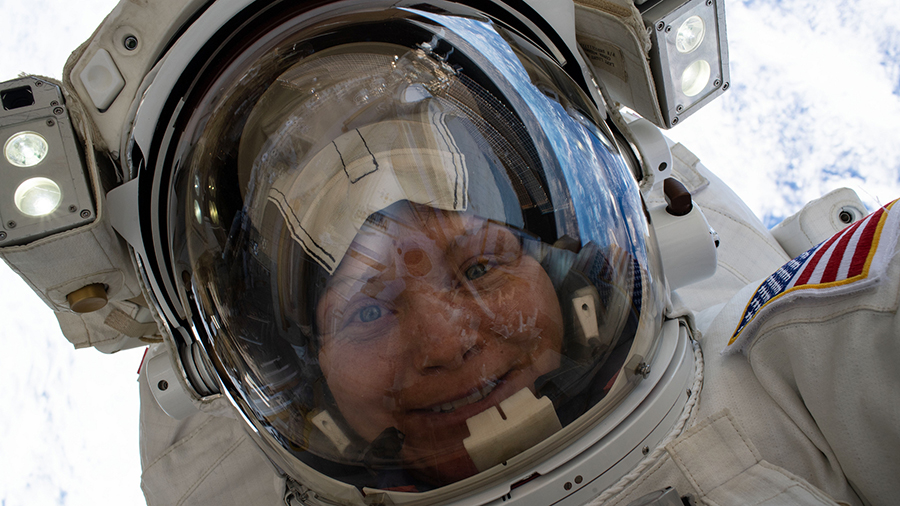2019 Astronaut Hall of Fame Honorees
Astronauts Jim Buchli and Janet Kavandi are inducted into the U.S. Astronaut Hall of Fame Class of 2019 during a ceremony on April 6, 2019.
NASA Image of the Day
Powered by WPeMatico
Astronauts Jim Buchli and Janet Kavandi are inducted into the U.S. Astronaut Hall of Fame Class of 2019 during a ceremony on April 6, 2019.
NASA Image of the Day
Powered by WPeMatico

Expedition 59 Flight Engineers Anne McClain of NASA and David Saint-Jacques of the Canadian Space Agency are scheduled to conduct another spacewalk Monday, April 8, to establish a redundant path of power to the Canadian-built robotic arm, known as Canadarm2, and install cables to provide for more expansive wireless communications coverage outside the orbital complex, as well as for enhanced hardwired computer network capability.
Watch the spacewalk on NASA TV and on the agency’s website. Live coverage of the spacewalk will begin at 6:30 a.m., and is expected to last about 6.5 hours. The spacewalk is set to start at 8:05 a.m.
This will be the 216th spacewalk in support of space station assembly and maintenance. McClain will be designated extravehicular crew member 1 (EV 1), wearing the suit with red stripes. Saint-Jacques will be designated extravehicular crew member 2 (EV 2), wearing the suit with no stripes.
This is the third spacewalk in under a month on the space station. The first two spacewalks installed powerful lithium-ion batteries for one pair of the station’s solar arrays. On March 22, the first spacewalk in the series was completed by McClain and fellow NASA astronaut Nick Hague. On March 29, the second spacewalk was completed by Hague and NASA astronaut Christina Koch.
The spacewalking work continues the overall upgrade of the station’s power system that began with similar battery replacement during spacewalks in January 2017.
Learn more about station activities by following @space_station and @ISS_Research on Twitter as well as the ISS Facebook and ISS Instagram accounts.
Mark Garcia
Powered by WPeMatico
ARISS Russia is planning Slow Scan Television (SSTV) image transmissions on 145.800 MHz FM from the International Space Station.
The transmissions begin Thursday, April 11, 2019 around 18:00 UTC and run continuously until approximately 18:00 UTC on Sunday, April 14, 2019.
This event uses a computer in the ISS Russian Segment, which stores images that are then transmitted to Earth using the ARISS amateur radio station located in the Service Module which employs the Kenwood TM D710E transceiver.
Once the event begins the transmissions will be broadcast at 145.800 MHz using the PD-120 SSTV mode.
Ham radio operators and other radio enthusiasts are invited to post the images they receive at http://www.spaceflightsoftware.com/ARISS_SSTV/index.php
Moreover, on request, ARISS SSTV Award Manager Slawek SQ3OOK will provide an SSTV Award, details at https://ariss.pzk.org.pl/sstv/
To submit a request, please follow this procedure:
1. Load your decoded images at https://www.spaceflightsoftware.com/ARISS_SSTV/submit.php
2. Fill in the application form on the website https://ariss.pzk.org.pl/sstv/
Please note that the event is dependent on other activities, schedules and crew responsibilities on the ISS and is subject to change at any time.
Please check the following for news and the most current information
AMSAT-BB https://www.amsat.org/mailman/listinfo/amsat-bb
ARISS https://twitter.com/ARISS_status
ISS Ham https://twitter.com/RF2Space
You can use online radios to receive signals from the International Space Station:
• SUWS WebSDR located Farnham near London http://farnham-sdr.com/
• R4UAB WebSDR located European Russia http://websdr.r4uab.ru/
ISS SSTV links https://amsat-uk.org/beginners/iss-sstv/
m5aka
AMSAT-UK
Powered by WPeMatico
Spain’s national amateur radio society URE reports the regulator has agreed to allow amateur use of 2400.050 to 2409.500 MHz to access the E’hail-2 / QO-100 geostationary satellite.
A Google translation of the URE announcement reads:
Since the State of Qatar sent the geostationary satellite Es’hail-2, the first of its kind to be used by radio amateurs, to space on November 15 of 2018, the URE satellite (AMSAT) raised the possibility of requesting the Administration the free use of the entire segment granted for radio amateurs in Spain and not only segment 2316-2332 MHz.
The Administration, responding to the request submitted by the URE, has developed the present resolution, which authorizes until September 26, 2019, to the holders of radio amateur authorizations, the emission of the amateur radio satellite service from 2400.050 to 2409.500 MHz. For single-sideband telephone communications, with a maximum eirp of 1500 watts, from authorized amateur radio stations located anywhere in the national territory.
The resolution of the Secretary of State for Digital Progress
https://www.ure.es/images/noticias/generales/RESOLUCION-Es-hai.pdf
URE in Google English https://tinyurl.com/SpainURE
Es’hail-2 QO-100 https://amsat-uk.org/satellites/geo/eshail-2/
m5aka
AMSAT-UK
Powered by WPeMatico
Janet Kavandi, director of NASA’s Glenn Research Center, and James Buchli are the latest veteran NASA astronauts to join the ranks of the U.S. Astronaut Hall of Fame.
NASA Breaking News
Powered by WPeMatico